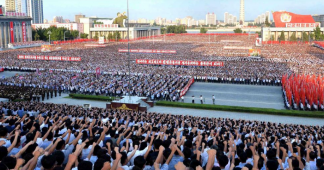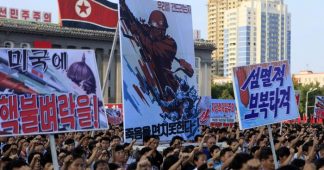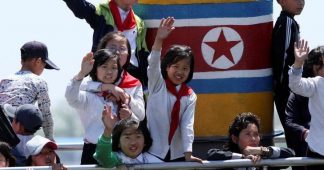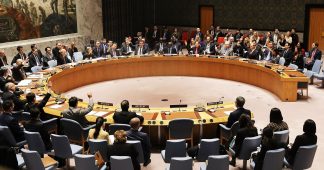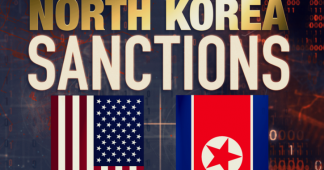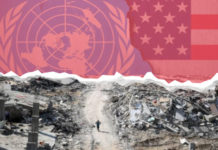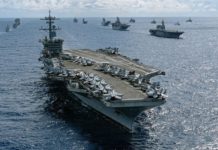By Dr. Alon Levkowitz and Dr. Ran Shauli
August 28, 2019
EXECUTIVE SUMMARY: The sanctions imposed on North Korea have a humanitarian cost of which most members of the general public in the sanctioning nations are not aware, and which is almost never discussed. This cost, and its implications not only for North Korea but for other sanctioned nations, should be brought to the forefront when decisions about sanctions are being made.
Over the past two decades, between half a million and one million North Koreans have died from hunger and related diseases. This famine was due to a combination of bad weather, drought, and failed governance.
Many died because the Pyongyang government established a system of unequal distribution of food, providing members of the urban elite, as well as industrial workers, with calorically greater and nutritionally better food quotas. In this respect, the Korean famine – at least in its first phase, which lasted from the early 1990s to the end of the decade – is reminiscent of Stalin’s infamous Ukrainian famines and Mao’s disastrous Great Leap Forward.
But the withdrawal of North Korea from the Treaty on the Non-Proliferation of Nuclear Weapons (NPT) in 2003 marked the point at which the food supply dropped dramatically and undernourishment became pervasive.
The responsibility for the widespread loss of life after 2003 lies not only with the North Korean government, but also – perhaps even equally – with those states that decided to use economic sanctions as a policy tool.
Sanctions are an instrument that countries, mainly the superpowers, wield to coerce other states into changing their policies. South Africa, Rhodesia, Libya, Iran, and North Korea are examples of states subjected to sanctions that were imposed either directly by other nations or through the UN Security Council.
The main mechanism of sanctions is economic pressure. The assumption of the policymakers imposing the sanctions is that they will increase the burden on citizens in the affected country, who will then respond by urging their leaders to change course. At that point, it is believed, the sanctions will have achieved their goal and become unnecessary.
Sanctions are perceived by the public in the sanctioning states – and are portrayed by policymakers in those countries – as a surgical, non-lethal, and even morally superior mechanism that increases discomfort but does no real harm.
The effectiveness of sanctions has been debated, but their humanitarian cost to the citizens of the targeted state is only rarely acknowledged. The logic underlying them is fundamentally flawed.
The states doing the sanctioning are generally democratic, whereas the affected states usually are not. The underlying assumption – that subjects of non-democratic or even outright totalitarian regimes will use agency they do not possess to force their leaders to change their ways – is almost never challenged. In non-democratic states, leaders are often willing to sacrifice the people to continue their rule. The North Korean regime has proved beyond any doubt that it subscribes to this practice: It provided food for the army and to members of the political elite at the direct expense of common people, whose food quotas were accordingly cut back.
Information assembled by agencies such as the UN Food and Agriculture Organization shows a clear correlation between the dates when sanctions were implemented (2003) and the prevalence of severe malnourishment in North Korea. A decade of hunger and semi-hunger has resulted in the deaths of more than half a million North Koreans. Today, in 2019, due to the combined effects of sanctions, the weather, and the failed management of the criminal regime, North Korea faces another hunger crisis that could lead to the deaths of many thousands more if some of the sanctions are not lifted immediately.
Alleviating the sanctions would not solve the problem, but it would prevent many deaths in the short run. In the long run, Pyongyang will need to change its economic and agricultural policy in order to prevent the next food crisis. Such reforms would force the regime to ease its control over some sectors of the economy, and to allow the acceptance and distribution of aid from foreign states or international NGOs. Such a situation would weaken the North Korean regime, which boasts a supposed “self-reliance” system – despite the fact that it is dependent on foreign states, like China, for its very survival.
Western policymakers, as well as the general public, should be aware that sanctions take a toll on people’s lives in numbers that are often equivalent to casualties caused by weapons of mass destruction. Policymakers in countries that initiate sanctions on non-democratic states, such as North Korea, should consider that they can have widespread lethal effects on the citizens of those states. They should instead consider sanctions that will target the political and military elite.
The debate over sanctions on non-democratic states, whose leaders are not affected by polls, should not be limited to the political arena. The cost of sanctions – the potential to cause the deaths of large numbers of people – should be discussed more often in both the academic and the public spheres, even when the states being sanctioned are defined by the West as rogue states.
* Dr. Alon Levkowitz, a research associate at the Begin-Sadat Center for Strategic Studies, is an expert on East Asian security, the Korean Peninsula, and Asian international organizations.
* Dr. Ran Shauli is a research fellow at the Harry S. Truman Institute for the Advancement of Peace at the Hebrew University of Jerusalem. He also teaches Southeast Asian History with a focus on Genocide, Diasporic Memory, and Agriculture at Bar-Ilan University and the Interdisciplinary Center in Herzliya.
Published at https://besacenter.org/perspectives-papers/cost-sanctions-north-korea/
